Story and photos by Shabna Ullah
At Gay Park, East Bank Berbice (EBB) the peace is only occasionally disturbed by vehicles passing through, honking their horns and slowing down to negotiate some of the potholes on the road.
The village, made up of residents of various ethnicities was described as being “quiet with no problem” and as a “nice place to live.” It is located just after Islington which borders New Amsterdam (NA).
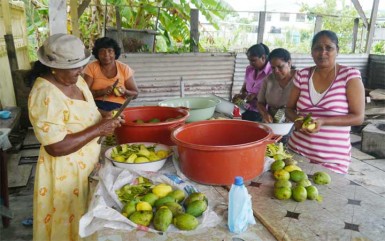
Although the name may suggest “happiness,” some of the residents said they are embarrassed by it at times because “people would laugh us and say only gay people live here.” They said the name should have been Providence and they would like it changed.
The village has a mosque and during this newspaper’s visit worshippers were returning home after the Friday prayers. It also has a church and a mandir which is under construction.
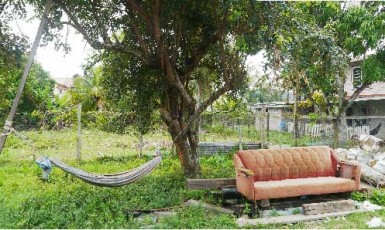
There are several shops and the BLT Enterprise Fertilizer Bagging and Blending facility which provides employment for many persons.
Reeaz Bacchus, a re-migrant had just returned home with his son, four-year-old Kaelan after picking him up from the nursery school. He is originally from Edinburgh but grew up in the Unites States of America. He returned to Guyana because he prefers to have his children attend school here.
Bacchus who operates the Flava Barber Shop and a game arcade was awaiting his next customer when this newspaper dropped in. He learnt the trade a long time ago and can “cut any style.”
His home is located next to the Alpha Children’s Home for orphaned children.
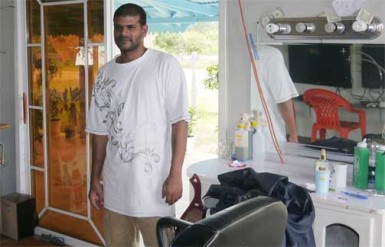
His friend, Abdool Azeez, 26, who dropped in for a haircut works as a labourer with H. Nauth & Sons Construction that is currently engaged in maintenance work along the EBB road. At the time he was on two weeks’ break from work. He recently moved to Glasgow Housing Scheme but still considers the village his home.
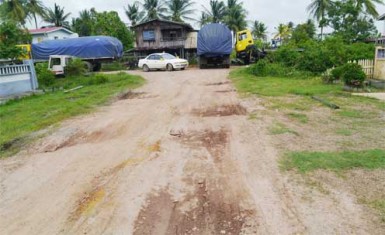
Residents were peeved that a man who owns trucks would park it along one of the streets and block some persons from gaining easy access to their homes. They also said that the man was contributing to the deterioration of the street and was not helping to fix it. The street which provides access to the mosque was also in a deplorable state and residents are calling on the government to help fix it.
Odessa James, a housewife and her niece Kassandra, 19, had finished their household chores and were relaxing at the time of this newspaper’s visit. Her nine-year-old son had gone to school. It was Friday and being dedicated Adventists who fast on Saturdays, they were planning to cook and clean the house later that afternoon so they would be free the next day. Kassandra has applied for jobs after completing the Tutorial Academy in 2012 and went for a few interviews. Although she was given a few offers she could not take the jobs because her religious belief does not allow her to work on Saturdays.
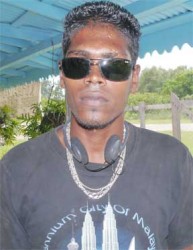
“Most of the places that call her said they are busy on that day and she cannot have the day off. A lot of people are experiencing the same problems and would prefer to take government jobs,” said Odessa. They would spend their Saturdays attending church, reading the Bible or “just spend a quiet and relaxing day. If we do any work, it would just be to help others. Sunday is a working day for us.”
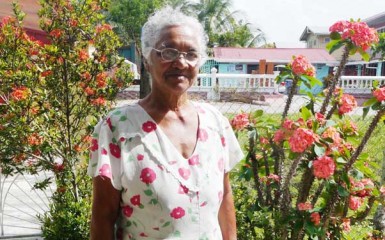
her flower plants
She has been living at Gay Park for the past two years after moving from Stanleytown, NA, located one mile away. She prefers the “village life because it is less hustle and bustle and more relaxing.” Kassandra was happy that her village would be featured and she even offered to take this reporter around to meet some residents.
In another part of the village, a group of women from the Hindu Society of Berbice were under a shed next to the Shri Krishna Mandir peeling green mangoes. They would grate the mangoes and use them to make achar, reserving it for when functions are being held. The women were also looking forward to the Phagwah Mela, a grand public event.
Their mandir was undergoing major construction work at the time. One of the women, Indra, told the ‘World Beyond George-town’ that the mandir was very small and could not accommodate its members. A small wooden building that had deteriorated was initially replaced by a concrete one, but it was still inadequate to accommodate all the worshippers. “That is proof that the population is growing,” Indra laughed.

Through fund-raising activities, a huge building was being constructed at the time. Indra also showed this newspaper another modern building that the members had constructed for multi-purpose use. The building has a conference centre in the lower flat as well as a kitchen, while the upper flat has self-contained rooms for both local and foreign visitors.
In the early days, the village had just a few houses and was not well populated. Some of the persons living there at the time were an inspector, Mitchell; Dr Appadoo and business-man Ramesh Maraj.
“Only a few years ago the village became populated when new people came and bought land and built houses and others renovated the old buildings,” she said.
Maraj, despite being in his mid-70s, still operates a business in New Amsterdam and is also very active in the church. His wife, a female pandit had started a Hindi school a long time ago. When Sunday Stabroek visited, she was recuperating from an illness.
Across the road, Adrian Hinds was sitting on the veranda looking out and was quite willing to speak to this newspaper. Originally, from Baracara, Canje River, he first moved to Sheet Anchor, East Canje before settling in the village six years ago with his family. His other relatives from that area have migrated to US.
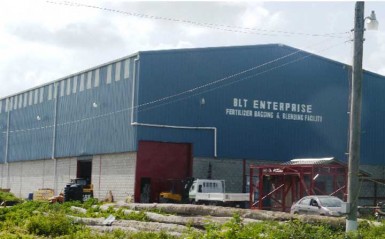
He worked at the Transport & Harbours Department for seven years and recalled that travelling with the NA/Rosignol ferry service “was adventurous because you got to meet a lot of people.”
After his retirement he planted a kitchen garden and reared cattle but is now thinking of engaging in house-to-house selling.
He reminisced that “back in Baracara life was hard, but nice; at least we didn’t have to pay bills. He came out so that his children can benefit “from a higher standard of education.”
Hinds said he is “comfortable in the village and I am living nice with my neighours. I find that serving God is good. It is the best thing you can find in life.” He said that when persons do not turn to God it results in a lot of suicide. According to him, persons need to have a “close relationship with God or with older person who they can speak about their problems with and get advice.” He went on to say that “older persons need to interact with the youths more often” and that “prayers can help shield the youths.”
Ren Ramatally was sitting in her grocery and confectionary shop watching a movie when we entered. She has a warm personality but was too shy to be featured. She and her husband, Andrew started the business three years ago. Andrew has planted trees on the parapet to beautify the area around his home, quite in contrast with another part that had overgrown weeds and garbage dumped along the street.
Some residents complained that the drains at the back of the village were clogged and that the drain-age and irrigation workers were “not doing enough.” They lamented that dur-ing the rainy season they would be affected by flooding.
Shirley Laltoo, 72, came out by her bridge when her neighbour, Hinds called out to her. She was about to return inside when we approached. She invited us in and stood by the lovely flowering plants that she takes care of herself, for a photo. She sat in her hammock as she reminisced on her days growing up in the village.
As a young girl her parents worked at the Providence estate and they lived in a logie – a long wooden building with separate apart-ments. Four other families also shared the logie. Shirley remembered travelling to New Amsterdam with horse-drawn buggies and going to Georgetown by train for just five cents. “Those were the sweet days,” she said smiling. “They were real nice. Things were cheap. I could have bought a lot with my money then…”
She learnt sewing from her mother and earned a living as a seamstress but now she just concentrates on taking care of household chores and her plants. Her granddaughter visits and assists her sometimes.





